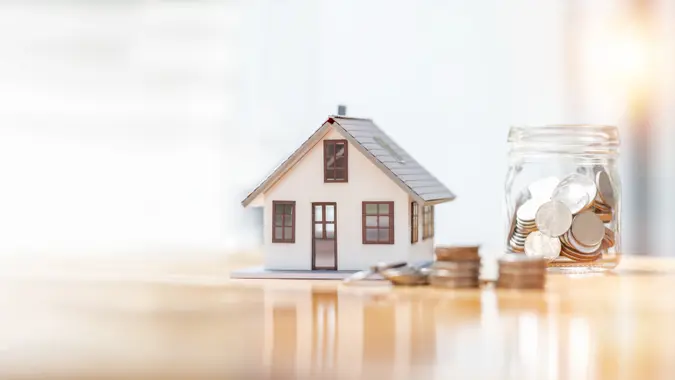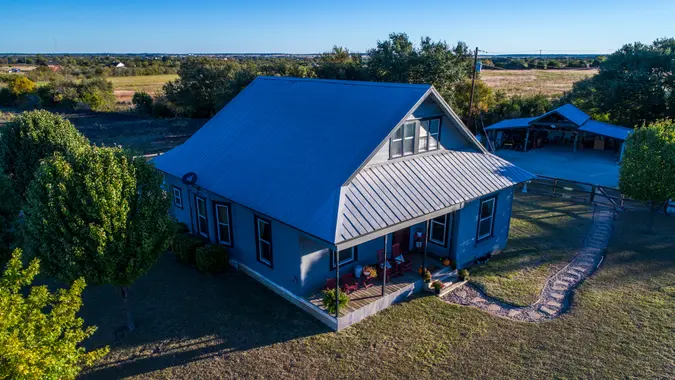Average Mortgage Rate by Credit Score: What To Expect

Commitment to Our Readers
GOBankingRates' editorial team is committed to bringing you unbiased reviews and information. We use data-driven methodologies to evaluate financial products and services - our reviews and ratings are not influenced by advertisers. You can read more about our editorial guidelines and our products and services review methodology.

20 Years
Helping You Live Richer

Reviewed
by Experts

Trusted by
Millions of Readers
Buying a home is likely the largest purchase you will make in your lifetime. To make it as affordable as possible, it’s best to start the process when you’ve established a high credit score, as your score affects the rate you’ll get on your home loan.
Here’s a look at the average mortgage rate by credit score so you know what to expect based on where you are now and where you may want to aim for.
Average Mortgage Loan Interest Rates by Credit Score
As of March 8, the average mortgage loan rates were 6.76% for a 30-year fixed-rate mortgage and 5.89% for a 15-year fixed-rate mortgage, according to Freddie Mac. However, your actual rate will depend on your credit score.
Here’s a look at the average mortgage rate by credit score, as reported by Experian using Curinos data.
| Credit Score | Average 30-Year Conventional Rate | Average 15-Year Conventional Rate | Average 5/6 ARM Rate |
|---|---|---|---|
| 620 | 7.89% | 6.48% | 7.01% |
| 640 | 7.72% | 6.48% | 6.88% |
| 660 | 7.61% | 6.46% | 7.1% |
| 680 | 7.55% | 6.46% | 6.82% |
| 700 | 7.42% | 6.46% | 6.93% |
| 720 | 7.38% | 6.45% | 6.99% |
| 740 | 7.26% | 6.45% | 6.89% |
| 760 | 7.18% | 6.45% | 6.83% |
| 780 | 7.07% | 6.45% | 6.84% |
| 800 | 7.07% | 6.45% | 6.84% |
| 820 | 7.07% | 6.45% | 6.84% |
| 840 | 7.07% | 6.45% | 6.84% |
Why Your Credit Score Affects Your Mortgage Rate
Mortgage lenders use your credit score as one of the factors when determining what rate you will receive.
“Your credit score plays a critical role in determining your mortgage rate because it is viewed as an indicator of risk and how you manage debt,” said Darren Tooley, senior loan officer at Cornerstone Financial Services in Southfield, Michigan.
“With conventional loans and most other programs, the credit score can impact the rate and fees by as much as several percentage points,” he said. “Higher credit scores typically result in lower interest rates because they signal a stronger likelihood of on-time repayment. In comparison, lower credit scores may lead to higher rates or even denial, as lenders view these scores as higher risk.”
The exception to this rule is if you qualify to receive a mortgage through one of the available government programs.
“With certain government programs like [Federal Housing Administration] (FHA) and [Department of Veterans Affairs] (VA) loans, as long as your credit score is average or above, the score may have little or no impact on your interest rate,” Tooley said.
Other Factors Affecting Your Mortgage Rate
While your credit score greatly impacts your mortgage rate, there are other factors lenders take into account when determining your loan terms.
“These include your loan-to-value or down payment, loan term, loan type and even your debt-to-income for specific programs or when determining private mortgage insurance,” Tooley said.
“Many programs offer a slightly better interest rate for shorter terms,” he continued. “For example, a 15-year term will offer a better interest rate than a 30-year term. Also, as a general rule, the larger the down payment, the lower the interest rate. However, there are some exceptions where putting the minimum down payment may offer a slightly lower interest rate, which is designed to help make things more affordable, especially for first-time buyers.”
How To Secure a Favorable Mortgage Rate With a Lower Credit Score
Many lenders require a credit score of 580 or higher to receive a mortgage loan, according to Experian. However, you typically need a score of 760 or higher to qualify for the best rate. If you don’t meet this threshold, there are moves you should make to get a competitive rate.
“Start by paying down high-interest debt and correcting any credit report errors, which can help boost your credit scores,” Tooley said. “If paying down debt isn’t an option, consider applying for an FHA loan or checking if you are eligible for other government programs like a VA loan or [U.S. Department of Agriculture] (USDA) loan, which allow more lenient credit requirements. Lastly, work with a trusted lender and loan officer who can work with you on your credit while determining that they are looking into the best programs to suit your needs.”
More From GOBankingRates
Sources
- FreddieMac, “Mortgage Rates”
- Experian, “Average Mortgage Rates by Credit Score”
- Darren Tooley, Cornerstone Financial Services
 Written by
Written by  Edited by
Edited by 

























